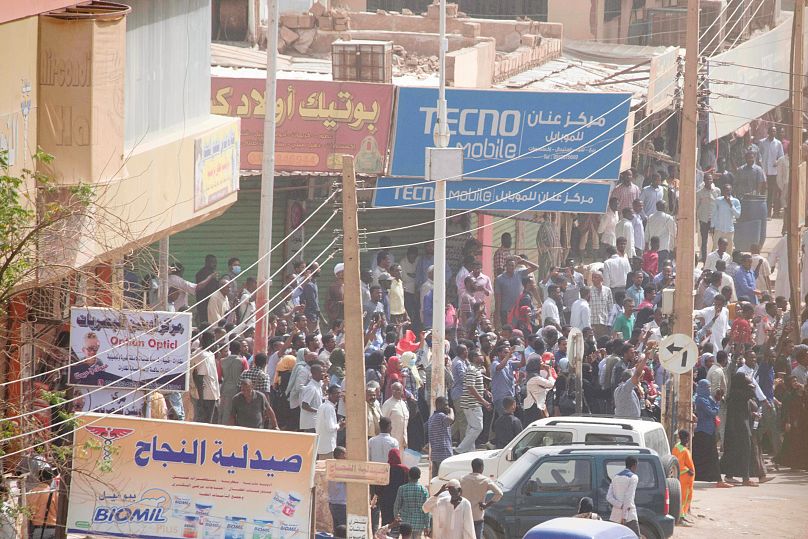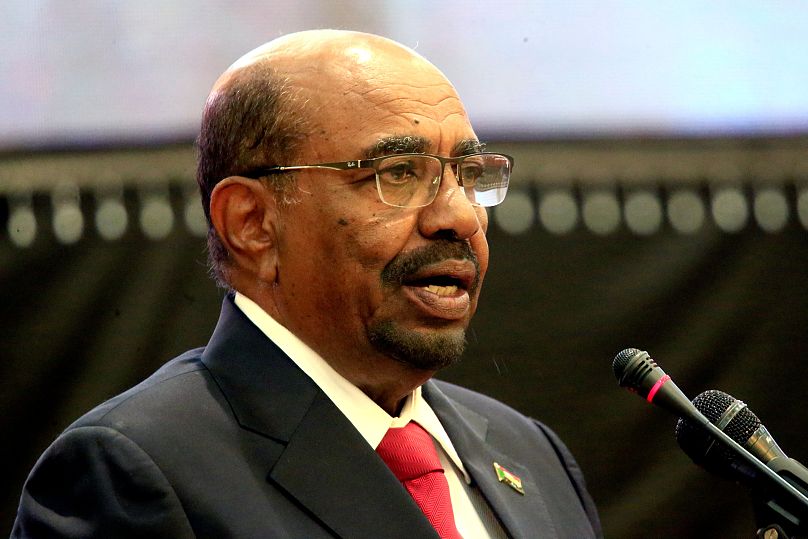Euronews looks at why people are continuing to protest in Sudan
Sudan, in North Africa, is entering its third month of protests calling for President Omar al-Bashir to stand down.
While many see the uprising as Sudan's Arab Spring, the situation on the ground is not receiving the same international media coverage as previous events in Tunisia, Egypt, Libya or Yemen.
Euronews took a closer look at what’s happening on the ground in Sudan, by talking to Sudanese sources who asked for anonymity due to the sensitivity of their situation in the country.
The root of the problem
In 2011, the southern part of the country gained independence and become the Republic of South Sudan. The move deprived Sudan of its oil reserves — since then, the economy has spiralled downwards, resulting in higher prices for bread and other basic commodities.
On top of that, the economy was hit by sanctions from the US because Washington accused the state of sponsoring terrorism.
These sanctions were widened after the International Criminal Court found President Omar al-Bashir's regime guilty of genocide in the eastern region of Darfur.
What started as demonstrations in the north against bread prices swiftly spread nationwide and shifted towards a clear demand to topple al-Bashir’s 30-year rule, after he came to power on the back of a military coup in 1989.
The protests
At first, the demonstrations were numerous yet sporadic, but they have become more organised over the past few months. There are weekly protests in the capital Khartoum, the central-southeast region of Al Jazirah and the River Nile state.
The Khartoum marches, in particular, total thousands of protesters every week and take place in the heart of the city, close to the presidential palace and a number of ministry headquarters.
High numbers of women take part, who have long complained of sexism in Sudan and hope that a change in the ruling regime could grant them more equality.
The response
Protests have been met with a robust response from the Sudanese security forces who regularly use tear gas, flares and sound grenades. Live ammunition has also been fired according to a number of local and international media reports.
Authorities claim that 32 people, including three officers in the security forces, have died during demonstrations but activists, including the New York-based Human Rights Watch, said that at least 60 have died, with hundreds of protesters jailed.
Police claimed an arrested teacher died of food poisoning in custody but a government probe showed that he died as a result of “deploying sharp tool to his body”.
Political opposition
No opposition political party is at the forefront of the Sudanese protests. Local sources told Euronews that previous experiences made people lose faith all politicians, including opposition parties.
Instead, a Union of Workers is working undercover to organise protests as well as assigning medical and emergency teams for each demonstration.
The union vowed to keep up the pressure, although Euronews' sources said that many poorer workers risk financial hardship if they stop working to participate.
Al-Bashir’s ruling National Congress dominates the Sudanese parliament, with opposition in the form of Democratic Unionist Party members and other independent members of parliament.
The regime
Al-Bashir and his regime are yet to show any signs of succumbing to the protesters’ demands, with the 75-year-old president blaming unnamed “infiltrators” and foreign powers for the unrest.
Yet, the official tone has softened over the past few weeks with al-Bashir and his top officials seemingly trying to win over demonstrators by promising to tackle financial problems and release political prisoners.
Prime Minister Moetaz Moussa described protesters' demands regarding improving the economy as “legitimate”.
The military
High-ranking army officials support al-Bashir’s regime but lower-ranking officers are more likely to be compassionate towards the protesters, as they experience more daily economic hardship, one source said.
Reports that army officers who sided with protesters had been suspended or imprisoned recently emerged. The military responded by issuing a statement saying demonstrators were harming Sudan and vowed not to allow the “downfall of Sudan”.
Following this, Defence Minister Ahmed Awad Ibn Auf also softened his tone and said protesters “have a reasonable ambition”.
The rest of the world
Al-Bashir does have some foreign support, notably from Qatar and Egypt. No countries are currently putting pressure on al-Bashir to stand down.
The future
Insiders said that the protesters’ power cannot be undermined but it will take a lot more to oust an establishment as entrenched as al-Bashir’s.
“The government is facing its biggest threat in 31 years, but it won’t fall that easily because it is very solid from the inside,” one source told Euronews.
“The regime is stronger than what protesters think and weaker than what it thinks of itself,” he added.













